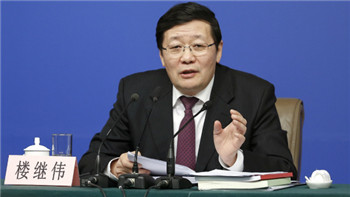(单词翻译:单击)

China’s finance minister has come under fire after he proposed changing a labour law he said was overprotective of employees and inflexible to business.
中国财政部长受到抨击,原因是他提议修改一部劳动法律,称其对雇员保护过头,对企业不灵活。
Lou Jiwei’s remarks on national television on March 7 caused a storm on social media, with many Chinese venting their frustration at a government they say is out of touch with their concerns.
楼继伟3月7日在全国电视台发表的这番言论在社交媒体上引发轩然大波,许多中国人借此机会发泄自己对政府的失望,他们认为政府与群众关心的问题脱节。
“He represents the backward forces, sweatshops and those small workshops that should long have been eliminated,” a user named Du Jian said in one characteristic post on Sina Weibo, China’s version of Twitter. “Lou is holding China back and wants to keep us reined to the tattered wagon of the sweatshop!”
“他代表着反动势力、血汗工厂以及那些早该被淘汰的小作坊,”新浪微博(中国版的Twitter)用户杜建(音)在一个有代表性的帖子中表示。“楼正在阻碍中国的前进步伐,想要让我们被绑在血汗工厂的破车上!”
The working class, which once enjoyed cradle-to-grave security and entitlements known as an iron rice bowl, has been increasingly squeezed by rising housing prices and slowing wage growth as the economy cools.
随着中国经济放缓,一度享有从摇篮到坟墓的保障和“铁饭碗”的工人阶级日益受到房价上涨和薪酬增长缓慢的挤压。
It is highly unusual for a sitting Chinese minister to attract such public criticism. The lack of action by internet censors suggests either that China’s much maligned democracy is more vibrant than it is often given credit for, or the government has yet to decide how to respond.
中国的一个现任部长招致这样的公众批评是极不寻常的。中国的网络审查部门没有删贴似乎表明,要么是中国饱受诟病的民主气氛比外界所想象的更为活跃,要么是政府尚未决定如何回应。
Mr Lou’s championing of business concerns over workers’ rights is also a measure of how far the Communist party has moved ideologically during decades of market reform.
楼继伟重视企业关心的问题甚于工人权利,还反映出经过几十年的市场化改革后,共产党在意识形态上发生了多大的转变。
“An employee may not work hard and the law makes it difficult for the employer to deal with it by, for example, firing him or her,” Mr Lou said on Monday. “That prevents another prospective employee from taking the position.”
“一个职工如果工作不努力,企业很难对他进行处理,比如解雇,”楼继伟周一表示。“那么位置就被占着,对新入职的就形成歧视。”
Ultimately, he said, making it easier to fire workers would benefit the workers.
他表示,归根结底,降低解雇难度对劳动者是有利的。
“Who eventually bears the costs? The working class who the law was intended to protect,” he said.
“谁最终承受代价?这部法律本来要保护的工人阶级,”他说。
Many of China’s online community failed to see his logic.
中国的很多网民看不懂他的逻辑。
“Have him investigated,” said Se Kong Se Kong, another Weibo user. “He’s no good if he’s speaking on behalf of the capitalists!”
“好好查查他,”另一个微博用户Se Kong Se Kong表示。“代表资本家讲话就不是好人!”


